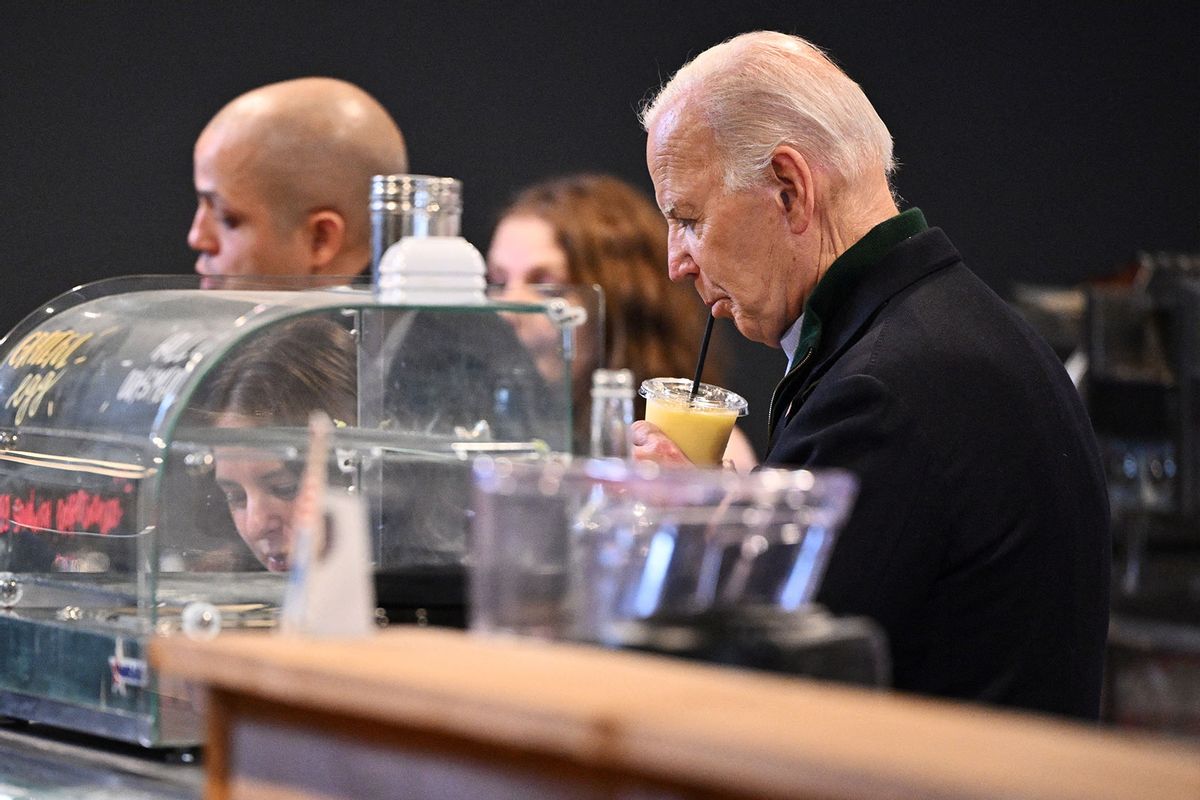Fox News outrage over Biden’s “smoothiegate” misses the most important point about food inflation

With the election only ten months away, President Joe Biden is getting out of the White House and, just like scores of politicians before him, heading out to campaign along America’s Main Streets and visit the food businesses that line them. Historically, this is both a predictable and risky move. Sure, knocking back whiskey shots in an Indiana bar (a la Hilary Clinton in 2008) may establish you as an everyman in the mind of your constituents, but it may also reveal you to be a bit of a fraud, like when Gerald Ford choked on still-husked tamal while campaigning in San Antonio or when mayoral-hopeful Andrew Yang took and documented an ill-fated New York City “bodega” tour.
According to some, however, Biden made a different kind of political faux pas when visiting Nowhere Coffee in Emmaus, Pa., a quaint community of 11,500 nestled on the northern slope of South Mountain, on Friday. After ordering a smoothie, he expressed shock at the $6 price tag. Whether his surprise was real or feigned depends on if you ask press secretary Karine Jean-Pierre — who says it was a joke — or Fox News, as the network has been running consistent “smoothiegate” coverage in the days since in order to demonstrate how apparently out of touch Biden is from his constituents.
In a press conference on Wednesday, Fox Business reporter Edward Lawrence asked Jean-Pierre: “Last Friday, the president was at a coffee shop in Pennsylvania, and he seemed to be surprised that the smoothie was $6 and how expensive it was. I’m curious. So is the president now realizing the costs that Americans are bearing?”
On the surface, this question could seem like a complete throwaway partisan line of “gotcha” interrogation, but it actually contains multitudes, though perhaps not necessarily in the way Lawrence was envisioning: Inflation is real and Americans, especially those who already straddle the poverty line, are really feeling it. This means that hunger is also incredibly real, and it requires solutions beyond talking heads bemoaning the cost of a coffee shop beverage.
To adequately address America’s surging food insecurity crisis, advocates say federal programs like the Supplemental Nutrition Assistance Program (SNAP) and Special Supplemental Nutrition Program for Women, Infants, and Children (WIC) should be prioritized and fully funded. However, these are the exact same programs that Republican lawmakers have sought to weaken for decades, culminating in significant changes to SNAP eligibility in 2023 and a potential budgetary cut to WIC in 2024, all while millions of Americans report that they have difficulty feeding everyone in their families.
The conservative-led “smoothiegate” only highlights this hypocrisy.
As Salon Food reported in March 2023, food security advocates anticipated that America was racing towards a “looming hunger cliff” and with the last year officially in the rear-view, it’s becoming increasingly clear just how steep it actually was. New data released the day before Thanksgiving from the Census Bureau’s Household Pulse Survey showed that nearly 28 million people reported experiencing food scarcity in October — both the highest number of 2023 and the highest number recorded by the survey since December 2020.
Just a couple months prior, in September, new SNAP eligibility requirements went into effect. Under the new guidelines, the age of recipients required to work in order to receive benefits was raised from 50 to 55 and, according to The Center for Public Integrity, makes it harder for states to waive work rules in areas with high unemployment. In an emailed statement at the time, Eric Mitchell, the executive director of the Alliance to End Hunger, said that the work requirements for which Republicans pushed are “punitive and ineffective.”
“They perpetuate the myth that people on economic assistance programs choose not to work when the evidence clearly shows otherwise, and by taking vital support away from SNAP participants, they actually make it harder to secure and maintain employment,” he said.
As we enter the new year, the ongoing food security of a different demographic is in question as House Republicans continue to push to pare back WIC spending, which benefitted two in five babies born in the United States in 2022. In a November emailed statement, Georgia Machell, the interim president and CEO of the National WIC Association, sounded the alarm.
“For the nearly seven million women, infants and children who participate in WIC, the peace of mind that comes with knowing that WIC is on solid ground through the holidays is tempered by the growing uncertainty that looms when funding will expire on January 19,” she said. “Congress has for months refused to consider the Administration’s urgent request for additional funds to cover WIC’s growing caseload.”
She continued: “That inaction increases the chances that states may have to start turning eligible participants away in 2024, or that current participants may at some point face benefit cuts. Either outcome would be unnecessary and unacceptable.”
The immediate fate of WIC and its participants should be made clear in the coming months. After narrowly avoiding yet another potential partial government shutdown on Friday afternoon, Congress now has until March to complete the arduous and likely contentious process of writing the legislation required to fund different government agencies, including the United States Department of Agriculture, which administers WIC.
So, yes, that $6 smoothie may seem absurd — and the fact that our president seemed momentarily surprised by its cost may be equally so — but it’s a salient reminder of how everyone across the political spectrum is impacted by inflation and, arguably, more concrete action should be taken to dampen its effects.
Read more
about this topic

